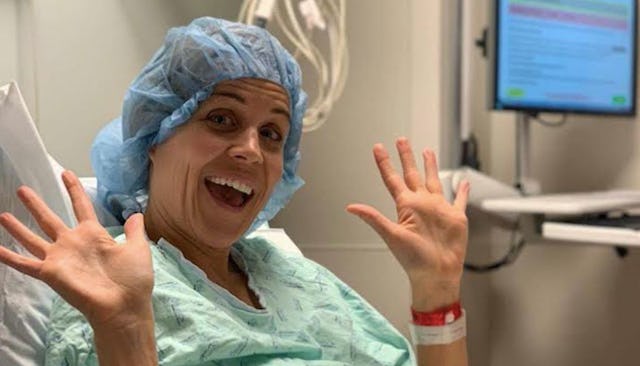Mom Of 5 Donates Uterus To Woman Who Experienced Years Of Infertility

She wanted to offer another woman the chance to carry her own child after experiencing infertility herself
A mother of five, who herself suffered through years of her own infertility struggles, decided to offer another woman the chance to carry a child — by donating her uterus.
Aprill Lane may have five children under the age of seven, but becoming a mom was far from an easy road for her. Years ago, she and her husband Brian were diagnosed with “unexplained infertility.” This is an extremely frustrating diagnosis, yet a common one in couples who don’t appear to have any outlying health issues preventing conception but are still unable to successfully conceive on their own.
They tried for four years to get pregnant through in vitro fertilization. When IVF wasn’t proving successful, they adopted their oldest son. Shortly after, she became pregnant through IVF with their second son. Twin girls and a third daughter arrived in short succession after that.
Image via Aprill Lane
“Infertility really, aside from the physical effects of it, it emotionally and socially affects you in a huge way,” Lane tells ABC News. “If I could help one other person be relieved of some of that, I would.”
So she decided to do just that.
Image via Aprill Lane
During her own experience with infertility and subsequent pregnancies, Lane helped run an infertility support group and began a scholarship foundation to help women pay for costly infertility treatments. This is how she first heard about uterus transplants. Baylor University Medical Center in Dallas was performing clinical trials at the time.
“My husband and I both felt like our family-building had been resolved but we weren’t necessarily resolved with building a family for someone else,” Lane says. “We knew pretty quickly after I got the call that I was selected that I was going to do it.”
When it comes to uterus transplants, candidates can be those who were born without a uterus, or may have had cancer or may have other malformations, like infection or damage caused by miscarriages, in their uterus. Both the donor and recipient must be in top medical condition to undergo the transplant.
Interestingly, the uterus does not stay with the recipient throughout their life. After the recipient gives birth to one or two children, the uterus is removed so the recipient doesn’t have to endure a lifetime of taking strong anti-rejection medication.
Lane paid for her own travel and time off work for pre-op appointments and the surgery itself. She was the 15th uterus transplant performed at Baylor. Her surgery, which lasted nine hours, was successful. Once her uterus was removed, it was inspected to ensure it was a perfect match for the recipient before being implanted.
Image via Aprill Lane
“Her story is incredible in itself because she was one of these women when she couldn’t have children, she chose options women had before uterus transplants,” said Dr. Liza Johannesson, Lane’s surgeon at Baylor. “She knows the struggle very close up, what these women go through.”
Lane tells Scary Mommy that because she’s heavily involved in the infertility community, it means a lot to her that the infertility community is interested in her story. “I’ve always had a lot of support in my roles within the IF community – it’s been humbling to see the response on a personal level,” she says. “For over a decade, my goal has been to be a support system for a community often misunderstood. To see my message of, Hope Never Fails, living through the response to the story, has been amazing.”
The recipient of Lane’s uterus remains anonymous. Typically the donors and recipients do not meet each other until long after the transplant itself — and only if they’re both okay with meeting one another.
Image via Aprill Lane
Lane tells Scary Mommy she hopes more women who have the means to do so will come forward and get screened as a potential donor. Giving another woman the gift of carrying her own child is quite something, after all.
“It’s not easy – the screening process is intensive, the amount of travel is a lot and the trial only covers the surgery – all the travel was out of pocket for us,” she says. “But hopefully others are able to make it work and become a donor.”